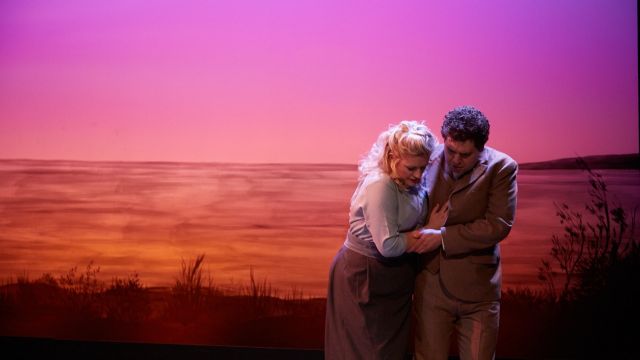Stella
Lyric Opera continues to explore obscurity with the first staged version of G. W. L. Marshall-Hall’s opera, Stella, in over 100 years. The Englishman Marshall-Hall was brought out to Australia as founding Ormond Professor of Music at the University of Melbourne and had a profound impact on the musical life of the city. This is believed to be the first opera written in Australia.
Written at the time of Puccini and Massenet, Stella is very melodic and pure verismo. The title character had a couple of beautiful arias and there were some lovely ensembles.
Spinto soprano Lee Abrahmsen had a triumph in the title role with a heart-wrenching performance. As the doctor who wanted to marry her, tenor Robert Barbaro was passionate and has developed more centre in his voice, though he lost focus on some extreme notes.
Baritone Shoumendu Ganguly was a strong pastor and Caroline Vercoe and Matt Thomas completed a strong cast.
The venue appeared to be a smaller version of Chapel off Chapel, with similar problems. The orchestra was on the floor in front of the performers and occasionally a bit strong. The simple set featured a verandah with a clothesline behind and the sea in the backdrop. This allowed for different levels and was used effectively.
This opera deserves to be heard, particularly if they can assemble a cast as strong as this. The Sold Out sign was encouraging.
Graham Ford
Photographer: Kris Washusen

Alex Armstrong also saw Stella.
I very much wanted to like this production: the first opera set in Melbourne and written by a hugely influential figure in Melbourne’s early cultural life; and revived by a company dedicated to performing Australian works.
Marshall-Hall’s debt to Puccini is evident in both his musical style (which was through-composed, richly melodic, with lush harmonies) and in following Puccini’s dictum of placing “great sorrows in little souls”, particularly with the unfortunate Stella.
The plot revolves around past sins crashing back into carefully-constructed lives: Stella, a nurse, finds herself face-to-face with Mayor Chamley, the man she ran off with a decade before, and who later abandoned her. While they are both keen to put the affair behind them, the sanctimonious Reverend Weldon recognises Stella as a ‘fallen woman’ and is determined to expose her past.
So far, so good: a juicy little drama. And a salutary lesson is delivered by Marshall-Hall via Mayor Chamley, who as a founder of the Social Purity Society, suddenly finds himself a potential target of its small-minded and self-righteous censure.
Set entirely on the back verandah of a house looking out over Port Phillip Bay, a sweeping painted backdrop by Mattea Davies was used to good effect and gave the space some much-needed depth.
However there were some significant issues with the production. The first was a flawed libretto, which signally failed to establish the rhythms of dramatic tension needed to take its heroine from pleasant nurse to tragic victim of circumstance, and take the audience on that journey with her.
The second was the theatre itself: normally it would be thrilling to have the singers so close in an intimate performance space. But the David Williamson Theatre is unsuitable for sung performances - the singers struggled with the muted acoustic, and the audience often struggled to hear the singers’ words and occasionally their voices (which, given they were at most 30 feet away, is saying something).

The orchestra was placed in an awkward wedge in front of the stage, and they were uncomfortably loud as soon as they got any louder than piano, which made much of the performance badly balanced, drowned out a good deal of the sung words and made errors and lack of ensemble glaringly obvious. The double bass player was in the middle of the orchestra rather than at the back and it was disconcerting to see the characters stroll past him almost at his eye level. While I understand space was at a premium in the theatre, Lyric would have done well to take a leaf out of XLArts’ production of Rusalka and have the orchestra placed far less intrusively, to allow the visual and musical focus to fall back on the singers.
As Stella, Lee Abrahmsen brought a sweet pathos to the role, and her lustrous tone and easy command of her instrument are an asset to any production.
Robert Barbaro’s Dr Kirke was idealistic and likeable, but although he had some excellent notes in his upper range, was vocally inconsistent otherwise - possibly due to the odd acoustic properties of the venue.
Caroline Vercoe brought solid acting and singing to the thankless role of Mrs Chase, an archetypal Respectable Housewife. Shoumendou Ganguly made the most of his portrayal of the oily Reverend Weldon, with his likeable tenor voice rising above the orchestra.
Matt Thomas was able to show his range a little more with the conflicted Mayor Chamley, the original architect of Stella’s ‘downfall’ now protected by his gender and position, but still horrified at the drama as it unfolds.
Director Jessica Harris has allowed for naturalistic expression, and for the simplicity of the story, but there is only so much which can be done with this material and production, which, despite the final tragedy, and some fine individual and ensemble singing, was curiously unmoving.
Alex Armstrong
Subscribe to our E-Newsletter, buy our latest print edition or find a Performing Arts book at Book Nook.

